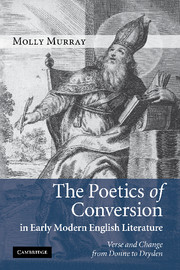Book contents
- Frontmatter
- Contents
- Acknowledgments
- Note on the text
- Introduction: toward a poetics of conversion
- 1 William Alabaster's lyric turn
- 2 John Donne and the language of de-nomination
- 3 Richard Crashaw and the gender of conversion
- 4 Versing and reversing in the poetry of John Dryden
- Afterword: Eliot's inheritance and the criticism of conversion
- Bibliography
- Index
1 - William Alabaster's lyric turn
Published online by Cambridge University Press: 04 August 2010
- Frontmatter
- Contents
- Acknowledgments
- Note on the text
- Introduction: toward a poetics of conversion
- 1 William Alabaster's lyric turn
- 2 John Donne and the language of de-nomination
- 3 Richard Crashaw and the gender of conversion
- 4 Versing and reversing in the poetry of John Dryden
- Afterword: Eliot's inheritance and the criticism of conversion
- Bibliography
- Index
Summary
In Colin Clouts Come Home Againe, Spenser's speaker catalogues those men of letters at Elizabeth's court who deserve greater fame, among them “Alabaster thoroughly taught / In all this skill, though knowen yet to few” (400–1). William Alabaster's name is now known to fewer still, but his mutable religious identity – and the inventive language he uses to describe it – provides a useful beginning for a discussion of the early modern poetics of conversion. The story of this serial convert begins in 1567, when Alabaster was born into a branch of the staunchly Protestant Winthrop family of Hadleigh, Suffolk (a town that John Foxe proclaimed a “Universitie of the Learned” for its early, fervent embrace of the Reformation). He was sent to study divinity at Cambridge, and became a chaplain to the Earl of Essex on his 1596 mission to Cadiz. Shortly after his return from Spain, however, Alabaster announced his turn to Catholicism. He was imprisoned and interrogated in England, then escaped to the continent, where he spent a period of exile among the English Jesuits in Rome. Upon a brief return visit to England, he was again imprisoned for recusancy; in 1603, after a pardon from James I, he began a phase of anti-Jesuit Catholic loyalism in England and abroad. In 1610, however, his book of cabalistic exegesis, Apparatus in Revelationem Iesu Christi (Antwerp, 1607), caused him to be brought before the Inquisition, charged with heresy, and briefly imprisoned by Catholic authorities.
- Type
- Chapter
- Information
- The Poetics of Conversion in Early Modern English LiteratureVerse and Change from Donne to Dryden, pp. 36 - 68Publisher: Cambridge University PressPrint publication year: 2009

